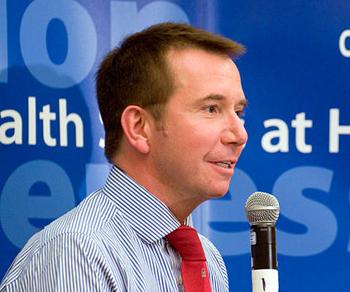In the wake of the May 2 election, Liberal MP Scott Brison finds himself in the midst of a much smaller caucus and is once again the only out gay man in his party’s elected representatives. Not that he’s worried about the level of support for queer issues in his party.
“Before joining the Liberal party, I was often isolated in terms of my beliefs, my values, my support for diversity and equality when it came to [queer] issues,” Brison says, in reference to his former affiliation with the Progressive Conservatives. “I’ve never felt that way in the Liberal Party. As long as Hedy Fry is around, I don’t think the gay community can have a better standard-bearer.”
Brison points out that Fry was leading the charge for gay rights before he was even elected. “We still have a caucus committed to equality and rights for all minority communities,” he adds.
The election saw two other gay Liberal MPs — Mario Silva and Rob Oliphant — lose their seats: Silva to the NDP and Oliphant to a Conservative.
“We’ve lost two great colleagues this time, and I regret that terribly,” Brison says. “I actually campaigned with Rob during the election, and Rob and [his husband] Marco have both been to our house in Nova Scotia. I spent a lot of time with Mario, who was on the International Trade Committee with me. Two thoughtful, learned, smart, principled members of Parliament who were a credit to public service — and will be again.”
Brison is reminded that politics is a tough business, and it wasn’t just out gay colleagues who lost, but other allies as well, such as Mark Holland, Mike Savage and Ken Dryden.
“We lost some really great friends of the community,” Brison says. “The results of some of these campaigns reminds us that politics isn’t always fair, and it’s not always a meritocracy.”
Brison notes that the negative attacks on Michael Ignatieff were “ruthlessly efficient” in creating a barrier between the Liberal leader and the electorate.
“During the campaign, over and over again people would ask me, Why is an American running for the prime minister of Canada?” he says. “When you have to explain the citizenship of your leader in the middle of an election, you’ve got a real problem.”
In his own riding, he was faced with particular coded messages directed at him.
“My opponent in the election, in his brochures, called himself a family man,” Brison says. “And to call oneself a family man certainly has certain implications to it.”
And yet it is his commitment to family — not only helping to care for his 81-year-old mother, who has Alzheimer’s, but also his plans to start a family with his husband, Maxime St Pierre — that is keeping Brison out of the running for the Liberal leadership.
“We are investigating options on that now,” Brison says. “I just think that if you’re to go through what we’re going to have to go through to make this happen, it’s important to both of us that we not only be parents, but good parents. It’s enough of a strain to be in federal politics and try to be a parent, and Maxime is in the investment business. And he’s now made a significant investment in a large restaurant — a 240-seat restaurant — and he’s a businessperson.
“I’ve got lots on my plate, and I just think that has to weigh on you.”


 Why you can trust Xtra
Why you can trust Xtra


